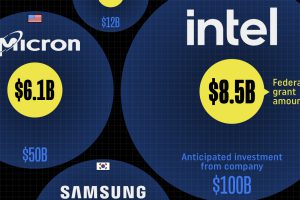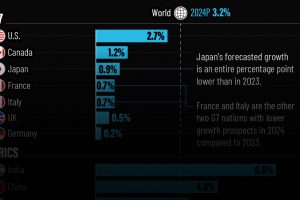Patent Wars: The Battle for Tech Innovation
In the technology industry, the imperative to innovate is never-ending.
After all, the speed of technological change is exponential – and if a company like Microsoft or Google misses one important trend, it can drastically alter the direction of future prospects.
For the above reasons, both tech giants and unicorns are laser-focused on hiring the best engineering talent available, and deploying it to come up with the new innovations, business models, and game-changing products that they feel comfortable betting their futures on.
The Patent War Visualized
Today’s interactive visualization comes to us from The UK Domain, and it shows the amount of patents won by tech giants as well as unicorn startups.
Specifically, it pulls data from the U.S. Patent & Trademark Office, categorizing hundreds of thousands of patents by company, technology, and even CEO.
While the data is quite comprehensive, it’s also worth noting that recent years of data may be incomplete because there is up to an 18-month lag between patent registration and those patents becoming public.
Who’s Winning the Battle?
Here is a look solely at the quantity of patents awarded over recent years:

Interestingly, the list tends to skew towards companies with a hardware focus, even though many of their software counterparts are larger in terms of market capitalization.
For example, Samsung has 138,934 patents registered, which is more than Apple, Google, Facebook, Amazon, Uber, and Netflix combined.
Hon Hai Precision Industry Co. – better known as Foxconn – is also one of the highest-ranking companies on the list with 25,356 patents, about the same amount as its partner company Apple.
Unicorn Lightweights
Unicorns, which are startups valued at over $1 billion, also have a tough time competing with the tech giants on the patent front.

Note: it looks like the source has included both public and private companies on this “unicorn” list
Many unicorns are newer companies, which means that the 18-month lag in patents entering the public domain may have a considerable effect on totals.
Still, it’s amazing to see that companies like Uber and Lyft – two competitors that have confidentially filed to go public in 2019 – have fewer than 200 patents between them.
Even if you combine all patents by the companies on the above chart, it works out to roughly 1,000 registered patents. To put that in perspective, that’s not even equal to 1% of Samsung’s gigantic total.





